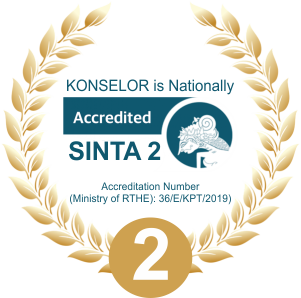Self Regulated Learning dan Locus Of Control Siswa Ditinjau dari Jenis Kelamin danLatar Belakang Budaya
 ), Herman Nirwana(2), Riska Ahmad(3),
), Herman Nirwana(2), Riska Ahmad(3), (1) Universitas Negeri Padang
(2) Universitas Negeri Padang
(3) Universitas Negeri Padang
 Corresponding Author
Corresponding Author
Copyright (c) 2017 Konselor
DOI : https://doi.org/10.24036/02015426461-0-00
Full Text:
 Language : en
Language : en
Abstract
One of the BK's teacher roles at school is optimize the learning result of student. Self regulated learning (SRL) and locus of control (LOC) are the factors that greatly influencethe learning result of student. This research is based on inconsistency research innovating about SRL and LOC ofmen and women from all kind of the cultures in Indonesia. The goals of this research are: (1) to describe SRL and LOC (2) to examine the differences of SRL and LOC of the students based on sex and cultural background.This research is quantitative descriptive and comparative. The populations are student at SMAN 1 Batusangkarand at SMAN 1 Balige(2015-2016). The sample were taken by using random sampling technique, the total of the sample is 350 students. Data were analyzed by percentage and MANOVAtechnique.The result of this research show that (1) SRL are quite good and LOC is belong to internalization (2) there is no significant difference of students who have Minangkabau and Batak, there are significant difference on SRL of male and female students in Minangkabau, and LOC there is not difference, there are significant differences in SRL of male and female students in Batak, and LOC is no difference, there are no significant differences on men and women in Minangkabau and Batak. The implications of the results of this research can be used as input to create a program of guidance and counseling services, especially in the development of learning.
Keywords
References
Atmazaki. (2007). Dinamika Gender dalam Konteks Adat dan Agama. Padang: UNP Press Padang.
Bety, N.A., & Nujmatul, L. (2013). “Pengaruh Locus of Control Terhadap Hasil Belajar Mahasiswa Akuntansi”. Jurnal Pendidikan Akuntansi Indonesia. XI (2): 11-18.
Borualongo. (2014). “Studi Mengenai Sistem Nilai pada Mahasiswa Etnik Batak, Minang, Jawa, dan Sunda di Bandung”. Prosiding SnaPP2014 Sosial, Ekonomi dan Humaniora. ISSN 2089-3590 | EISSN 2303-2472. 4 (2): 99-106.
Graves, E.E. (2007). Asal-Usul Elite Minangkabau Modern. Jakarta: Yayasan Obor Indonesia.
Harkness, S., & Super, C.M. (20130. “Parental Ethnotheorie in Western Culture”. New York: University of Connecticut. Dalam Rubin, K (Ed), Parent Beliefs, Parenting and Child. Journal Development in Cross-Cultural Perspective. New York: Psychology Press.
Heryanto, J. (2004). “Pergeseran Nilai dan Konsumerisme di Tengah Krisis Ekonomi di Indonesia”. Fakultas Seni dan Desain, Universitas Kristen Petra. 6 (1):52-62 http://puslit.petra.ac.id/journals/design/
Imran & Naeem. (2011). “Locus of Control in Graduation Students”. International Journal of Psychological Research: ISSN printed 2011-2084|ISSN electronic 2011-2079.
Jenny, K. (2001). “Self Regulated Strategies in Achievement Settings Cullture and Gender Differences”. Universitas of Haifa. Journal of Cross Cultural Phychology. 32 (4): 491-503.
Koentjaraningrat. (1996). Pengantar Antropologi. Jakarta: Rineka Cipta.
Lien, B.P., Tilor, E., &Seeman, T.E. (2001). Effects of Environmental Predictability and Personal Mastery on Self Regulatory and Physiological Processes. California: The Society For Personality and Social Psychology.
Marjohan. (1997). “An Investigation of Factors That Influence Decision Making and Their Relationship to Self Esteem and Locus of Control Among Minangkabau Students”. Disertasi tidak diterbitkan. Australia: Universitas of Tasmania.
Marjohan. (2012). “Pengembangan Internal Locus of Control dalam Pelayanan Konseling dan Implikasinya terhadap Perbedaan Budaya Klien”. Makalah Seminar Malindo 2. Padang: Jurusan Bimbingan dan Konseling Universitas Negeri Padang.
McCabe, L.A., Cunnington, M., & Brooks-Gunn, J. (2004). The Development of Self-Regulation in Young Children: Individual characteristics and evironmental contexts). New York: Guilford Press.
Nirwana, H. (2003).“HubunganTingkat Aspirasi dan Persepsi tentang Belajar dengan Hasil Belajar Matematika Siswa Sekolah Menengah Umum yang Berlatar Belakang Budaya Minangkabau dan Batak”. Disertasi tidak diterbitkan. Malang: Program Pascasarjana UNM.
Nuraeni, H.G., & Alfan, M. (2012). Studi Budaya di Indonesia. Bandung: Pustaka Setia.
Prayitno &Amti, E. (2004). Dasar-dasar Bimbingan Konseling. Cetakan Kedua. Jakarta: Rineka Cipta.
Sears, D. O., Freedman, J. L., & Peplau, L. A. (1985). Psikologi Sosial: jilid 2. Buku terjemahan (alih bahasa oleh Michael Adryanto). Jakarta: Penerbit Erlangga.
Sudjana, N., & Ibrahim. (2002). Penelitian dan Penilaian Pendidikan. Bandung: Sinar Baru.
Torop, E.S. (2005). “Kedudukan Anak Perempuaan Dalam Hukum Warisan Adat Pada Masyarakat Batak Toba Kecamatan Pontianak Kota di Kota Pontianak”. Tesis. Universitas Diponogoro.
Winne, P.H. (1997). “Experimenting to Bootstrap Self-Regulated Learning”. Journal of Educational Psychology, (Online). 3 (89): 397-410, (ftp://ftp.uwc.ac.za/users/DMS/CITI/bootstrapping.pdf/, diakses 04 April 2015).
Yaswirman. (2011). Hukum Keluarga: Karakteristik dan prospek doktrin islam dan adat dalam masyarakat matrilineal Minangkabau. Jakarta: Raja Grafindo Persada.
Zainuddin, M. (2010). Pelestarian Eksistensi Dinamis Adat Minangkabau. Yogyakarta: Penerbit Ombak.
 Article Metrics
Article Metrics
 Abstract Views : 980 times
Abstract Views : 980 times
 PDF Downloaded : 341 times
PDF Downloaded : 341 times
Refbacks
- There are currently no refbacks.
Copyright (c) 2017 Konselor







